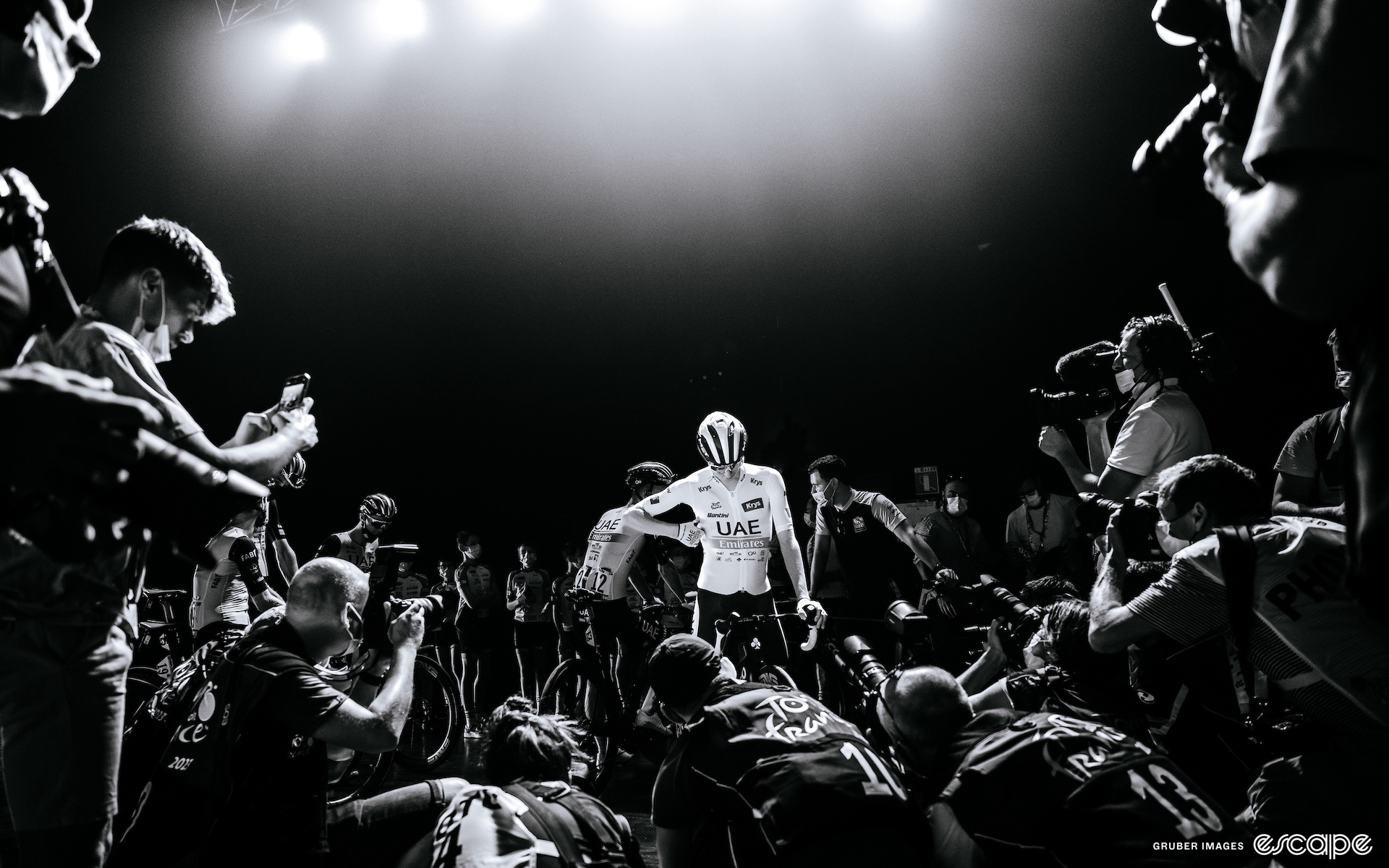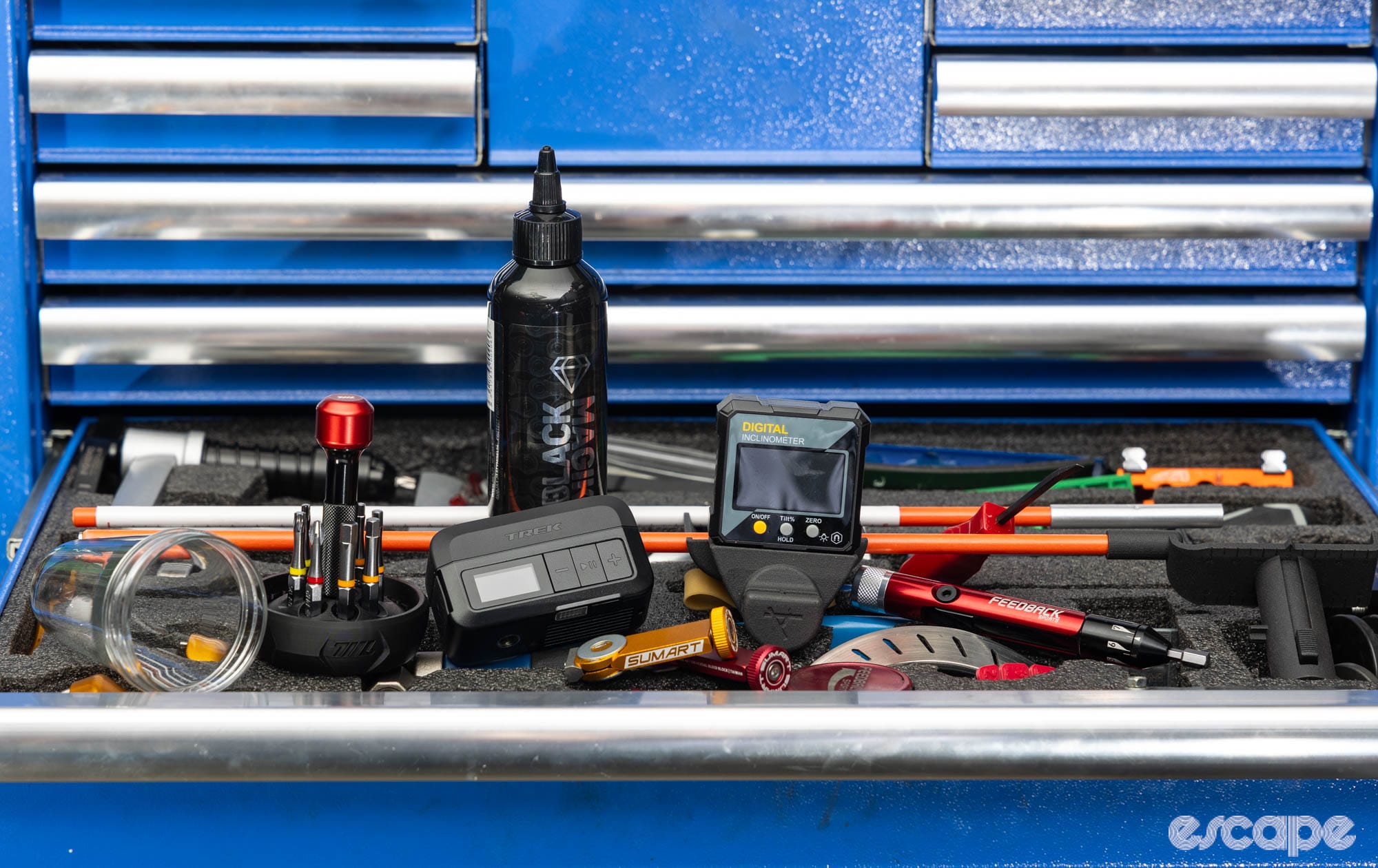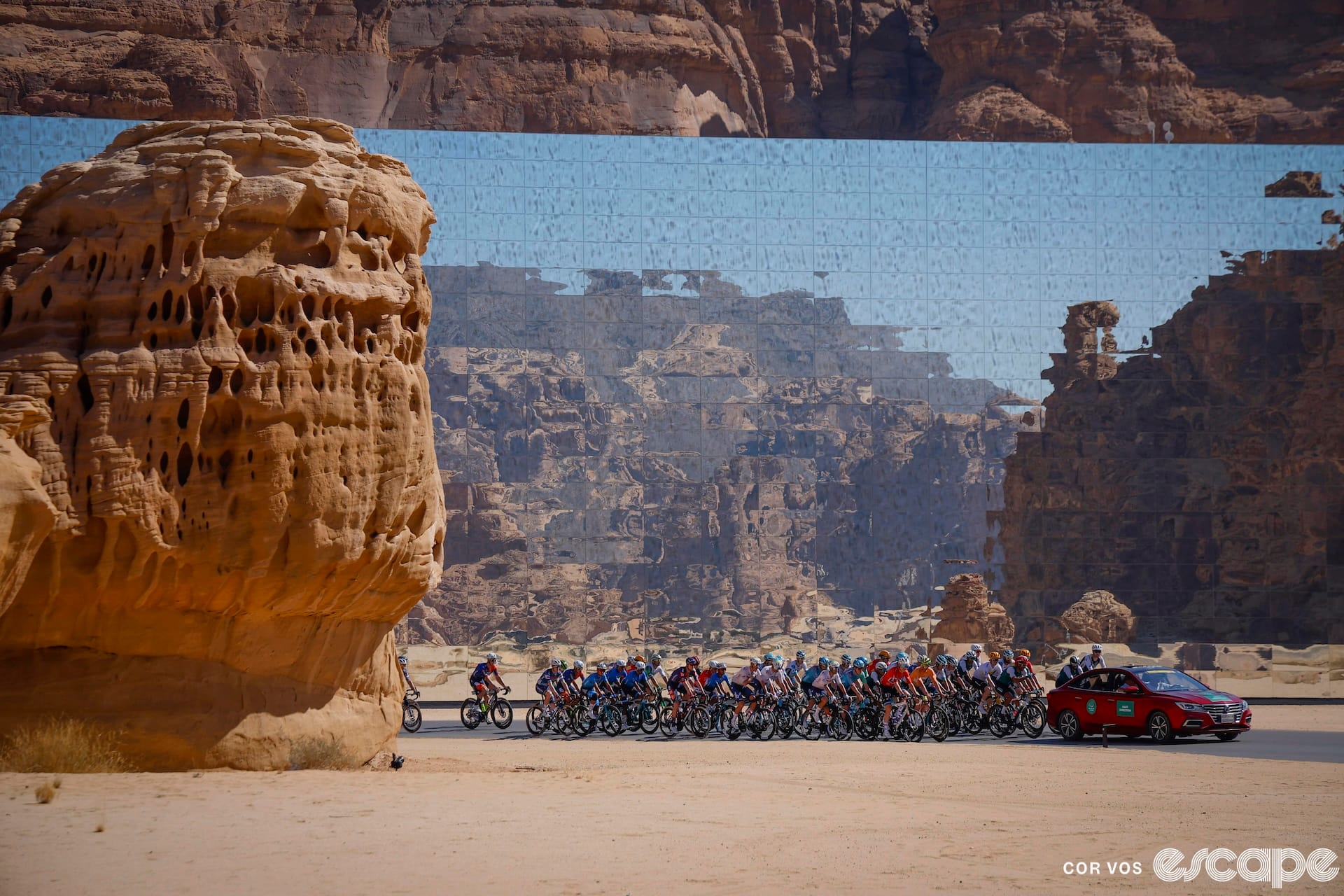One of the most guaranteed winners in pro cycling right now is Tadej Pogačar.
With second place overall at the Tour de France and third at last weekend's World Road Championships, it's easy to forget how unstoppable Pogačar was much of last spring, but he's been close, beaten only by the best of the best on their absolute peak of form. He has 16 victories and counting this year, on every kind of course. From Flemish bergs to French high mountains, Slovenian flats and Spanish gravel and in Monuments and stage races, seemingly no route profile is immune, no rival is safe from his proactive style of racing.
Oftentimes once he’s attacked and gone up the road, nobody can bring him back. It resembles the soccer equivalent of passing the ball to Cristiano Ronaldo (yes, Pogi is the outgoing Ronaldo to Jonas Vingegaard’s quieter Messi) on the halfway line and him running round most of the opposition team to score a goal.
“What really makes it special is he’s so good that you can do your best and 9 out of 10 times, he wins,” his UAE Team Emirates teammate Mikkel Bjerg says. “Most often, he pulls it off and finishes in a spectacular way.”
It’s tempting to think Pogačar's helpers can chill and twiddle their thumbs until he lights up a race. But generational talents like Pogačar need a crack support squad around them as much as anyone. And there’s a lot more to a worker’s job than meets the eye.
Three-time U23 world time trial champion Bjerg has become a valuable right-hand man. The duo go a long way back; the Dane remembers being in a breakaway with the Slovenian in the 2016 Junior Peace Race when both were slender 17-year-olds. (Pogačar won that day, naturally.)
And both are part of the special “class of 1998” inside UAE-Team Emirates, which also includes Giro podium finisher Joaõ Almeida, Marc Hirschi, Brandon McNulty, and Alessandro Covi.
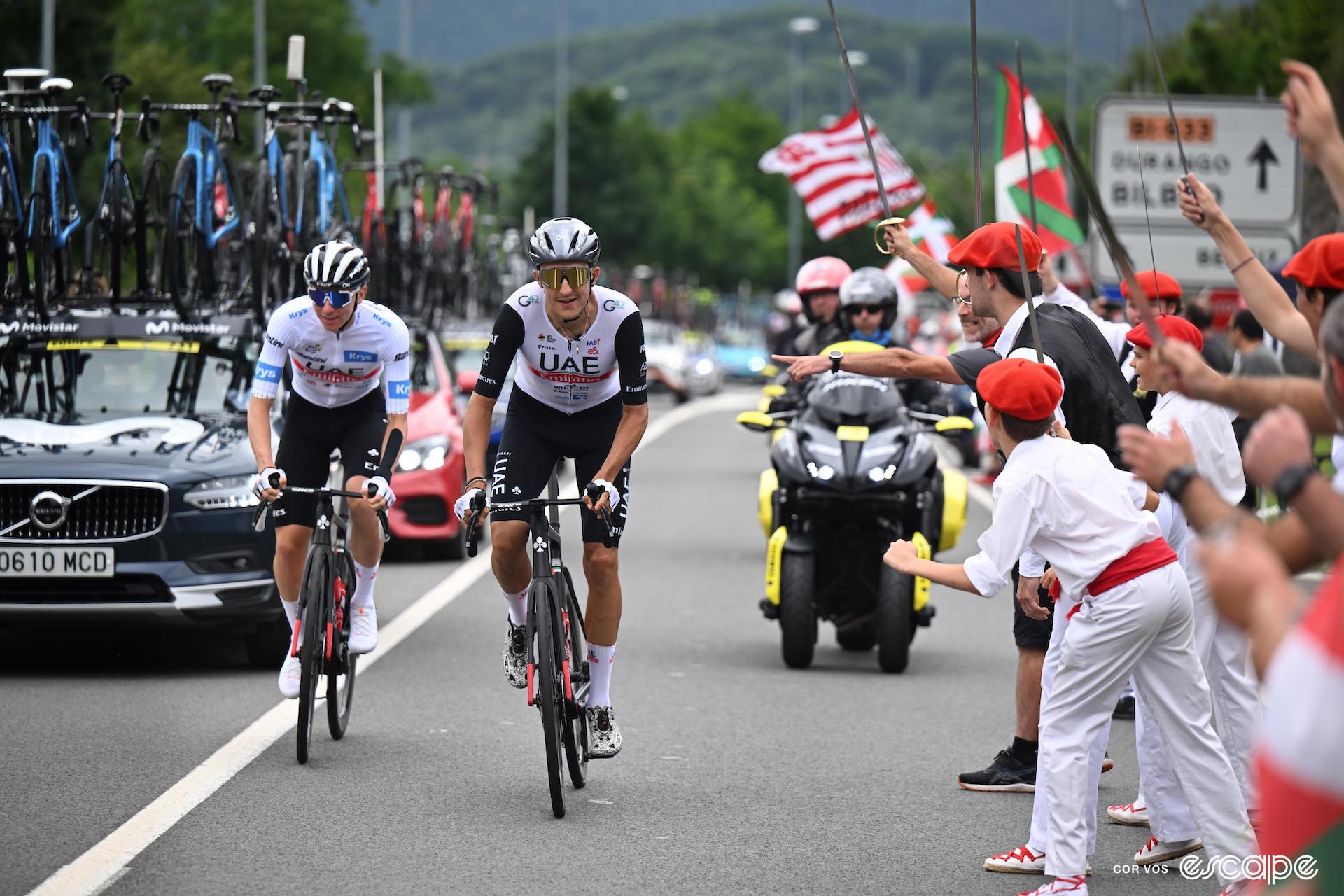
Planning comes first. Bjerg describes their tactical preparation as a “constant dialogue," with riders weighing in on their approach in the 24 hours before an important stage. Sports directors might lead the pre-race briefing, but according to the Dane, Pogačar always asks teammates what they think and is vocal about how he wants the final to be ridden.
“You really feel like part of the plan. It’s like what I can imagine happens in the army,” Bjerg says. “There is only one goal, and everyone in the group respects that.”
While Pogačar has climbers like Rafał Majka and Felix Großschartner for the mountains, it’s usually the job of Scandi powerhouses Bjerg and Vegard Stake Laengen to pull on the front to bring back groups or make sure their eventual catch is no mission impossible.
During the race, Bjerg says, the UAE Team Emirates riders will discuss how much time they think they can take back on an escape. “For example, in a one-hour climb, you can pretty easily close three to five minutes on the break, depending on the quality of riders in front,” he says.
It’s usually about putting their leader in prime position for the last climb. Once the Pogačar Express leaves the station in pursuit of victory or time gains, it’s a long waiting game for his teammates.
“Most often, you’re dropped and sit with the team cars in the grupetto,” Bjerg says. “You go back to ask what’s happening. And then they say ‘what do you think happened? He won.'"
(When he doesn’t, it can take a while to find out. Bjerg only learned about Pogačar’s three-minute time loss on the Col du Granon at the 2022 Tour de France from a Danish TV reporter after descending the climb post-race.)
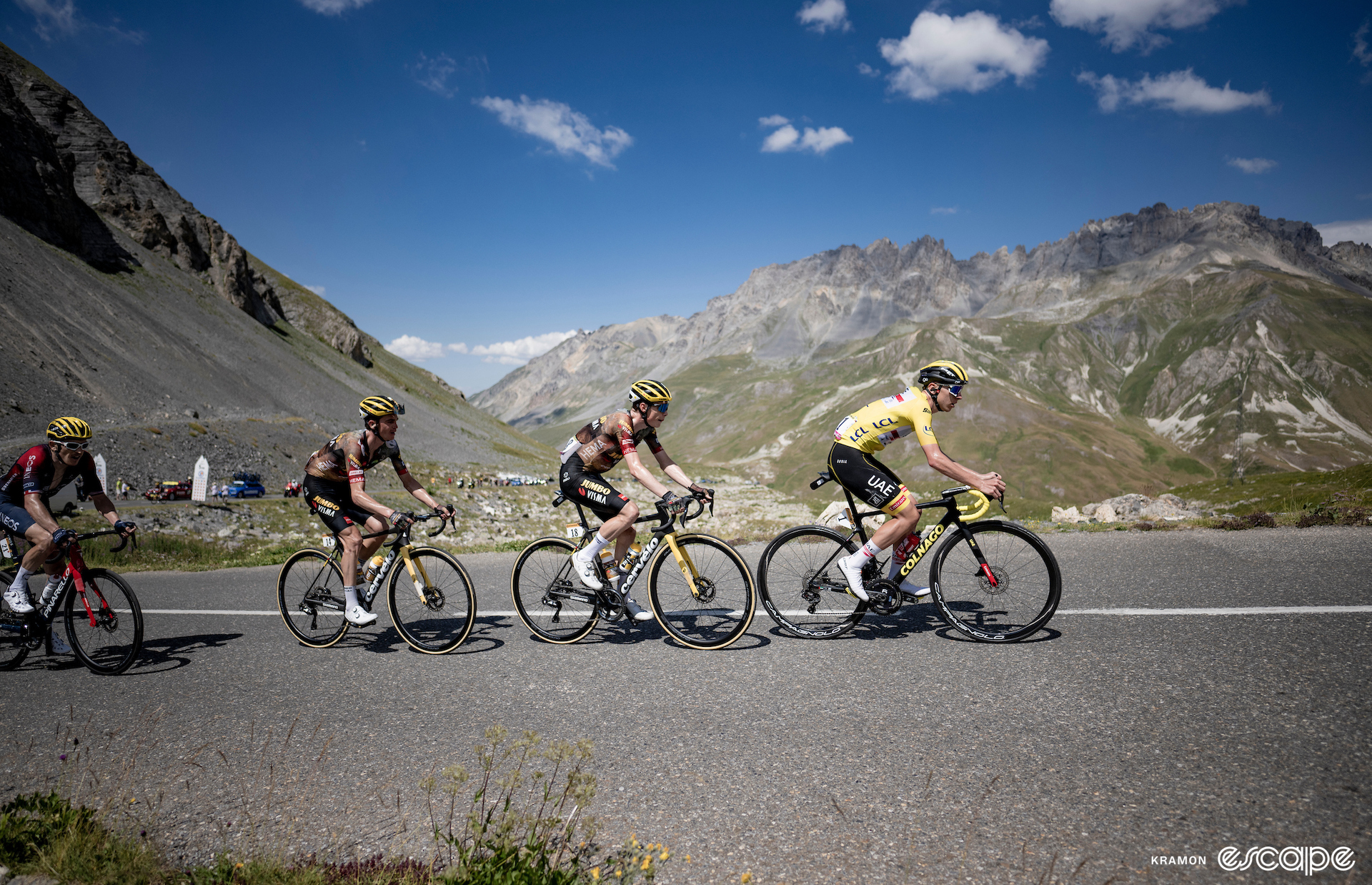
Sometimes on a Grand Tour, Bjerg doesn’t see his leader until dinner time, given Pogačar's post-race podium and anti-doping obligations. But the Slovenian's appreciation of his work there goes a long way.
“At least he's really vocal about it and says thank you," says Bjerg. "You can really hear that he means it, it’s from his heart. So it’s really easy to then say ‘I’ll do the same again tomorrow to get the same acknowledgement.’”
Then the jokes can start again. According to Bjerg, Pogi is "the guy that makes everybody laugh around the table. You feel like you’re friends with him, even if you’re new in the team. He would treat you like a guy he’s known for 10 years. He manages to create a nice space to be in for everybody.”
Mugging to the camera while going full gas, dancing on the team bus, photobombing rivals – as outsized and charismatic a character as Pogačar appears to be, given his sporting objectives, he also needs to be as chilled as the winter climes at Babno Polje [Slovenia’s coldest place, thank you Google – ed].
“If I won a stage in the Tour de France, I’d go completely crazy,” Bjerg says. “Dancing on the tables at dinner, stuff like that. But he has a goal for three weeks: to try to win the GC. When he wins, he’s happy, but he’s not …” Too happy? “Yes. And losing time, he is not too disappointed.”
Pro cyclists need a certain ruthlessness and self-obsession at times, but Bjerg says he has never seen that side of Pogi’s personality. His calm on the team bus before hectic moments helps the Dane to stay cool himself.
“He’d be dancing and joking with the soigneurs 20 minutes before a time-trial then win the stage,” he says. “I think he trusts a lot in his own ability, so he’s not really afraid of anything … he knows if he does his best, it’ll be fine. Even if he doesn’t win, he’ll have created a spectacular race.”
The 2022 Tour de France, in which Jumbo-Visma leader Jonas Vingegaard got the better of Pogačar, was a wake-up call for UAE Team Emirates (Bjerg talked to Escape Collective before the 2023 edition, which presumably offered another reality check).
“For two years, we walked on water, basically,” Bjerg reflects. “Everything we did, Tadej won. I think we just realized [after 2022] that we need to really get to our best every day. And if we do that, it’s possible to win again. I think everybody stepped up.”
Pogačar’s barnstorming spring campaign showed that. In a team meeting before Paris-Nice, he announced that he wanted to win three stages – and went and did it, alongside taking the overall. Now that’s confidence.
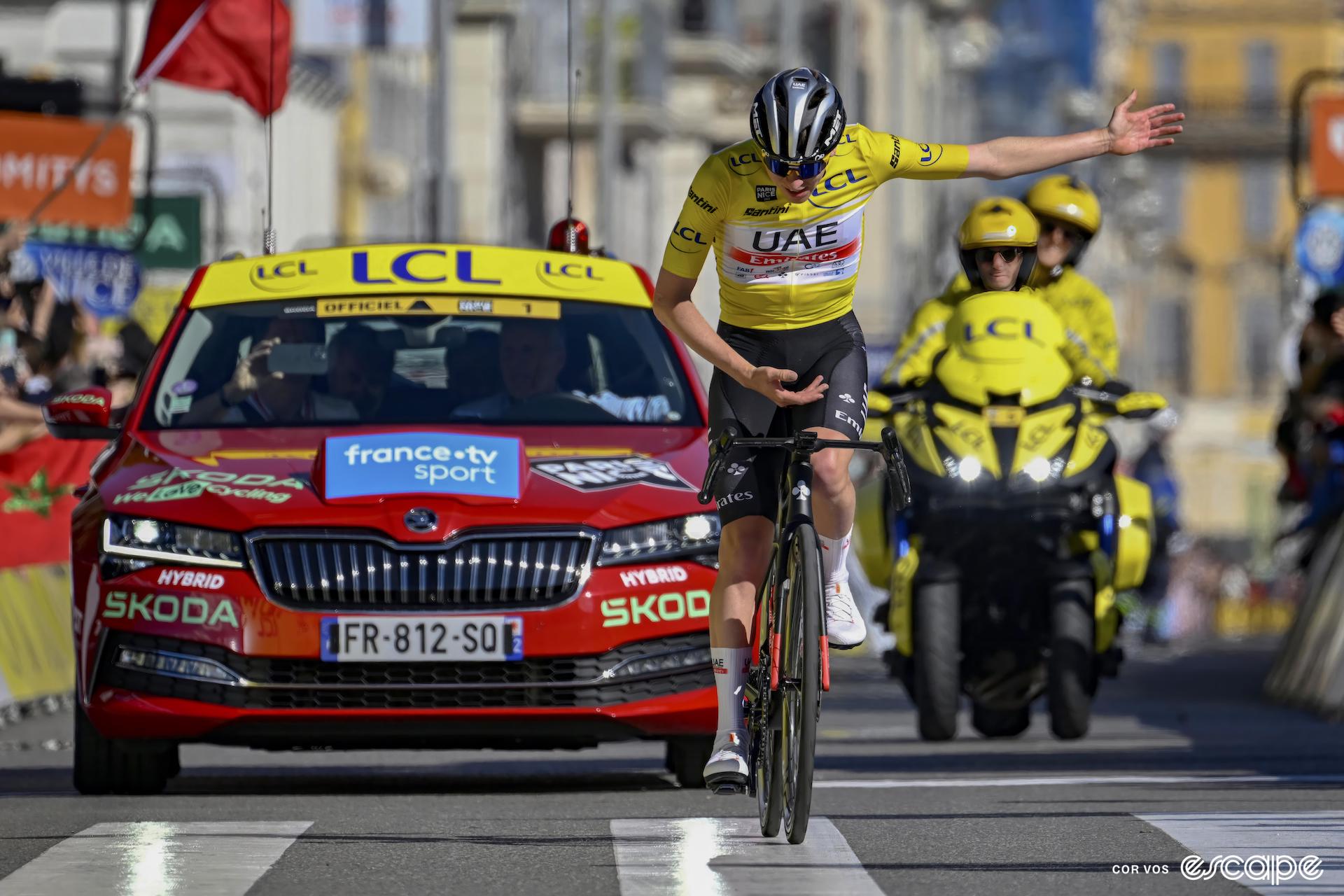
The Tour of Flanders was arguably the finest of his dozen wins across February, March, and April. Portuguese teammate Rui Oliveira was with him all day, protecting, positioning, and doing whatever Pogačar needed. Alongside Bjerg, he pushed the pace the second time up the Oude Kwaremont when they found themselves at the front.
“We didn’t have a plan to do a big acceleration there, but I think it was instinct,” Oliveira says. Pogačar told them to go and they made it hard, with 55 kilometers still to race. “The harder it goes, the better for him.
“I think that was the big moment where we controlled the race," Oliveira says. "As a team, we did it way better than the year before, where we let a big group go on the Berendries and weren’t there. This year, we were way stronger, always on the front.”
Crossing the line 11 minutes down, knowing his leader delivered, was “one of my best career moments,” Oliveira says. “I was as happy as if it was me winning. I felt part of it and even more proud that everyone was.”
Away from two wheels, Oliveira gets a chance to get one over his captain on the soccer console game FIFA, which is popular among UAE Team Emirates riders. According to Oliveira, Pogačar likes to play as behemoth Manchester City – very on-brand, given it's majority-owned by a private equity company controlled by Sheikh Mansour bin Zayed al Nahyan, vice president of the UAE. “I’d be lying if I said he beats me more than I do,” Oliveira says. “But he gives me a hard time on the bike.
“People probably don’t realize how hard he works,” Oliveira adds. “Sometimes he shows his training on TrainingPeaks. It’s insane, the quality of training he does – insane hours with insane power. It makes you realize with work, you can always do better. Being around him, working for him and winning races, I think we grow as cyclists and people.”
Therein lies the rub. Every pro rider comes into the sport with burning individual ambitions. Twenty-six-year-old Oliveira and those in the class of 1998 still have their best years ahead. A Tour de Suisse time-trial winner this summer, Bjerg could feasibly take aim at the cobbled Classics and races against the clock as a leader himself.
So, how to balance being a domestique and keeping personal goals, especially when versatile Pogačar can target any race?
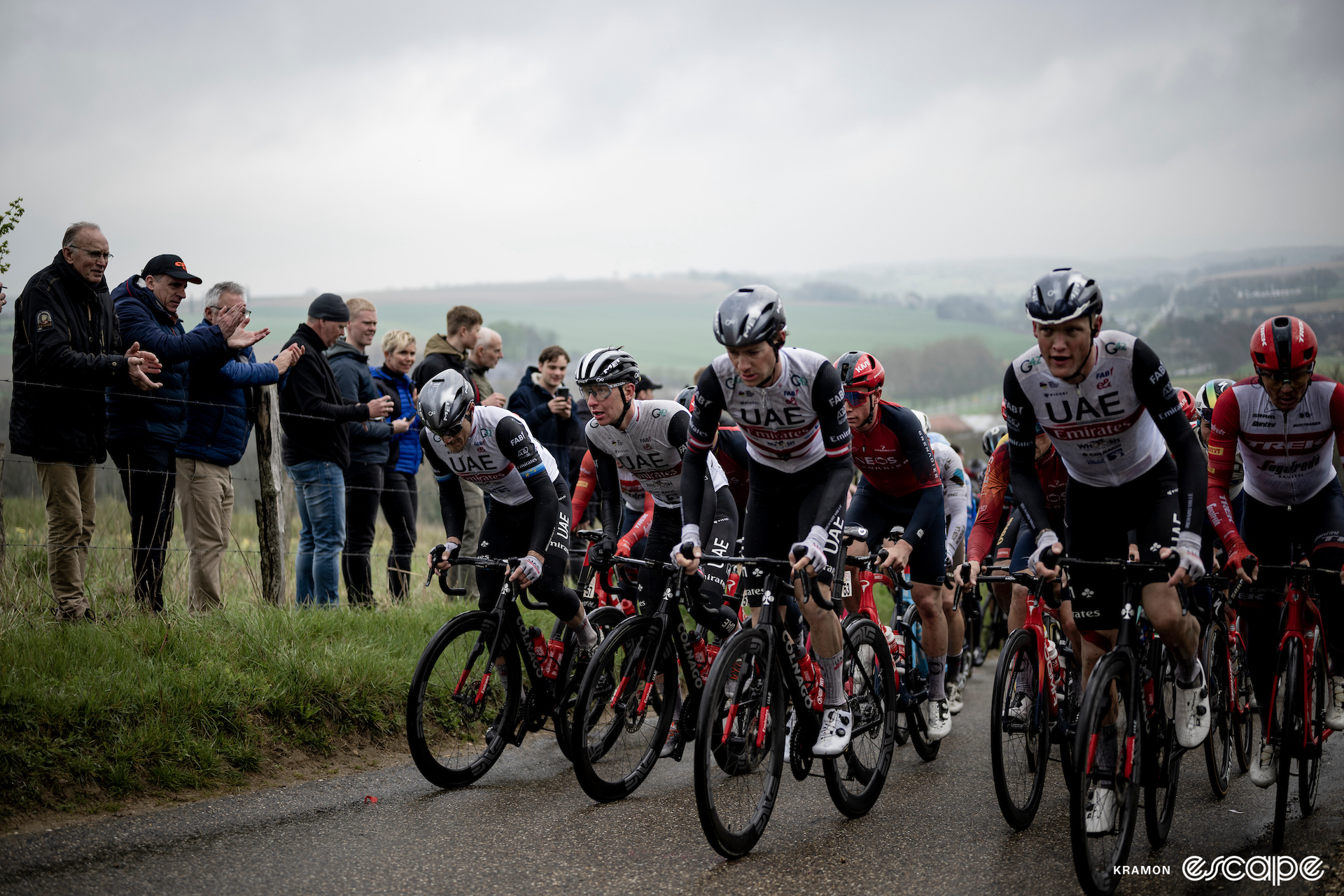
Bjerg explains that UAE-Team Emirates riders get a program at the season start. They focus on having excellent shape in certain periods, and try to fit in certain races for personal results. He has targeted a couple around the Tour de France, such as the Danish national time trial championship (he placed third) and the World Championship TT.
“I think we all know we can do good results, we can be up there,” Oliveira says. “But we are professional and honest enough with ourselves to know that if we have a guy like Tadej, he can really win. We know he can deliver, which makes it easier … I think we have to put our selfishness aside.”
With UAE Team Emirates having one of the highest budgets in the WorldTour, it’s safe to say the team's helpers are well-paid to go all-out for Pogačar. UAE Team Emirates riders also get a split of race prize money, a particularly high cut this season.
Extra-curricular acts of generosity help too. After the 2021 Tour de France win, Bjerg was given a yellow Vespa by Pogačar, signed on its side. “It’a a cool thing I think I’ll keep forever,” he says.
Emphasis on keep. “I rode it once and I went into a wall,” Bjerg says. “Then I realized this is not for me. It’s more a thing I cherish and look at than actually driving it. Because I’m afraid of crashing and breaking my legs or something,” he says, laughing. “I never grew up driving them, now’s not the time to take the chance.”
At least, he can keep doing the next best thing: riding hard to help a Slovenian motorbike take victories in the sport’s biggest races.
Did we do a good job with this story?

